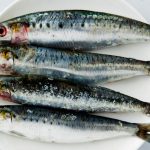 Although sardines were eaten fresh for thousands of years, this changed in the 1820s when the French began to can them in oil. In England, so popular did these canned sardines become that the expression to be packed in like sardines emerged in the first decade of the twentieth century as a metaphor for a crowded situation. The word sardine, however, has been current in English for much longer, since at least the early fifteenth century. Via French, the word derives from the Latin name of the fish, sardina, which may have been named after Sardinia, a Mediterranean island whose coastal waters were once abundant with sardines. In turn, Sardinia was probably named after the Sards, a people who emigrated to the island from North Africa thousands of years ago. The name Sardinia is not related to the word sardonic, an adjective that describes bitter laughter, but nonetheless the island’s name did indirectly affect the development of that adjective: the original Greek word for sardonic was sardanios, but in Late Greek this was changed to sardonios due to the influence of the Latin herba sardonia, a plant that took its name from the island of Sardinia where it grew. The two words—the Greek sardanios and the Latin sardonia—were associated with each other not just because they sounded similar but because the plant was reputed to cause painful convulsions and facial contortions in those who ate it, contortions resembling those caused by laughter. Accordingly, the later Greeks respelt sardanios as sardonios because they assumed, wrongly, that their word was somehow related to the Latin name of the plant, sardonia. Had they not made this mistake, we might now spell the word sardonic as sardanic.
Although sardines were eaten fresh for thousands of years, this changed in the 1820s when the French began to can them in oil. In England, so popular did these canned sardines become that the expression to be packed in like sardines emerged in the first decade of the twentieth century as a metaphor for a crowded situation. The word sardine, however, has been current in English for much longer, since at least the early fifteenth century. Via French, the word derives from the Latin name of the fish, sardina, which may have been named after Sardinia, a Mediterranean island whose coastal waters were once abundant with sardines. In turn, Sardinia was probably named after the Sards, a people who emigrated to the island from North Africa thousands of years ago. The name Sardinia is not related to the word sardonic, an adjective that describes bitter laughter, but nonetheless the island’s name did indirectly affect the development of that adjective: the original Greek word for sardonic was sardanios, but in Late Greek this was changed to sardonios due to the influence of the Latin herba sardonia, a plant that took its name from the island of Sardinia where it grew. The two words—the Greek sardanios and the Latin sardonia—were associated with each other not just because they sounded similar but because the plant was reputed to cause painful convulsions and facial contortions in those who ate it, contortions resembling those caused by laughter. Accordingly, the later Greeks respelt sardanios as sardonios because they assumed, wrongly, that their word was somehow related to the Latin name of the plant, sardonia. Had they not made this mistake, we might now spell the word sardonic as sardanic.
The term described herein refers to a group of diverse, small fish with tender bones that are harvested and prepared in various manners in numerous regions of the globe. These fish are referred to as sardines, and they include the pilchard – obtained from the waters of Sardinia in the Mediterranean and the coast of California, among other locations; the brisling or sprat sourced from Norwegian waters; as well as the alewife and herring from the Atlantic, particularly off the coast of New England, particularly Maine. They are known for being tightly packed in flat metal cans, usually in oil, mustard, or tomato sauce.
The term “sardine” initially referred to young pilchards captured near the shores of Sardinia. Over time, it has been applied to similar fish species found in various regions around the world. In North American waters, a fish from the herring family, commonly known as the “false pilchard,” assumes the name of sardine “sprat.” French and Portuguese sardines predominantly comprise young pilchards, while in the Soviet Union, they are typically young herrings. In Norway, sardines may encompass either sprats, also known as brisling, or young herrings referred to as sild. The name “sardine” thus encompasses a diverse range of fish species depending on the geographic location.
